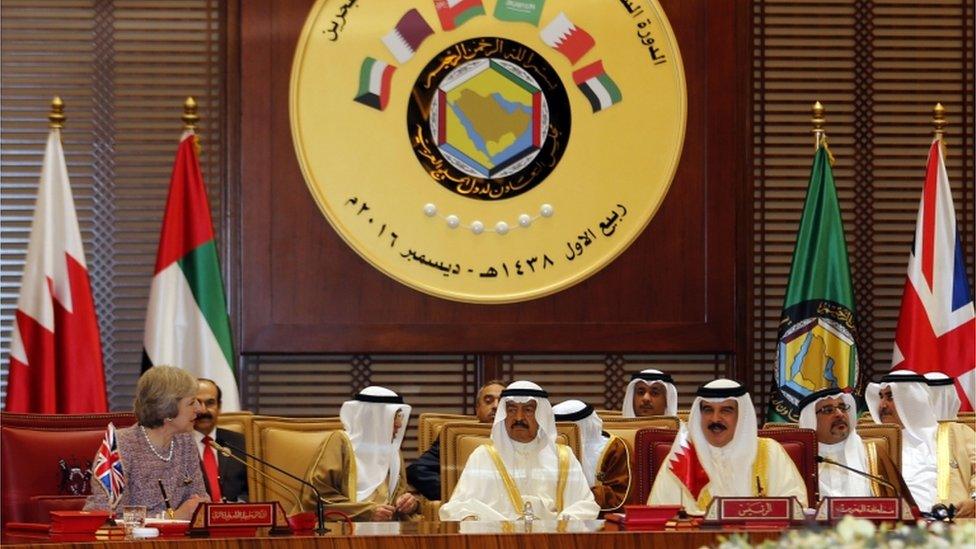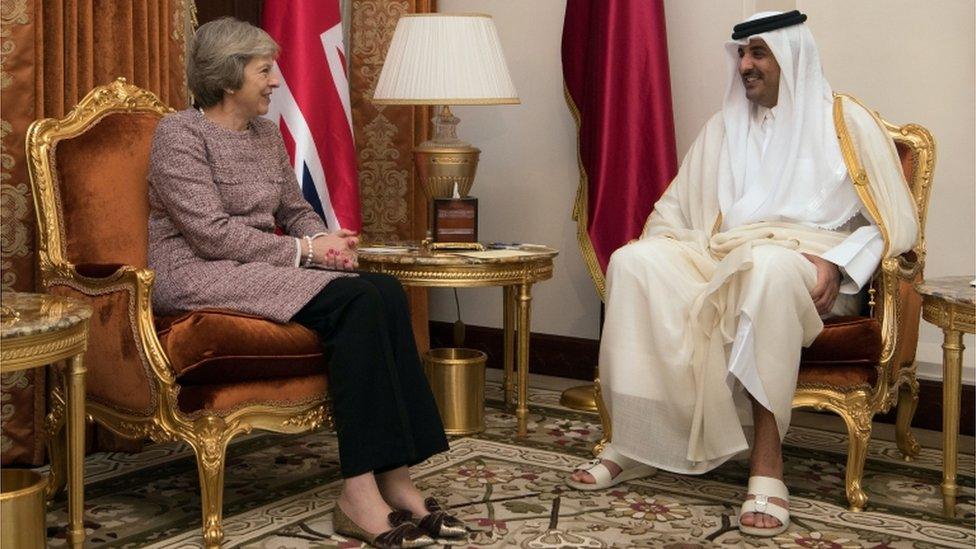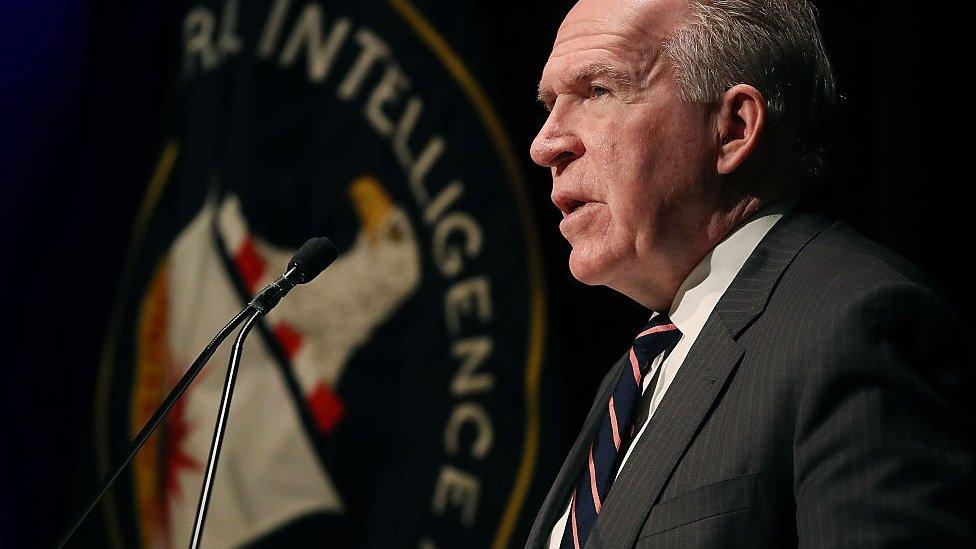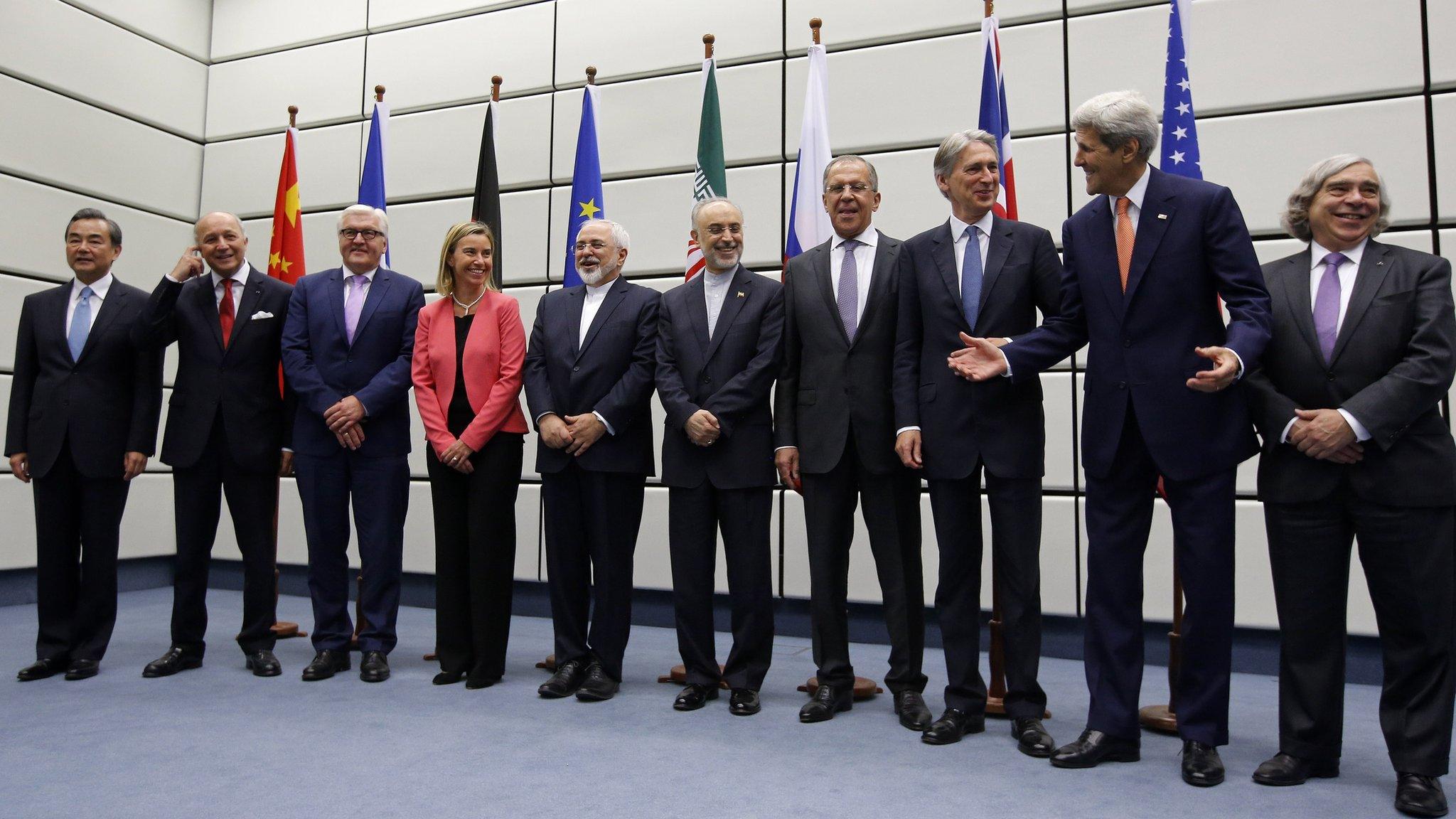Theresa May 'clear-eyed' over Iran threat
- Published

Theresa May is the first woman to be invited to the Gulf Cooperation Council summit
Theresa May has said she is "clear-eyed" about the threat posed by Iran to the security of the Gulf and wider Middle East, in a speech in Bahrain.
The prime minister stressed the importance of the deal struck last year which "neutralised" the possibility of the country acquiring nuclear weapons.
But she added that the UK would work with Arab Gulf states to counteract Iran's "aggressive regional actions".
US President-elect Donald Trump has threatened to scrap the nuclear deal.
Signed by Iran and the P5+1 group of world powers - the US, UK, France, China and Russia plus Germany - the deal lifted crippling economic sanctions, after the International Atomic Energy Agency certified that Iran had restricted its sensitive nuclear activities.
'Special market'
Speaking at summit of the Gulf Co-operation Council - comprising Saudi Arabia, Kuwait, the United Arab Emirates, Oman, Qatar and Bahrain - Mrs May also said the UK wanted to "make a more permanent and more enduring commitment to the long-term security of the Gulf" and would invest more than £3bn in defence spending in the region over the next 10 years.
"Gulf security is our security," she said.
"Extremists plotting terror attacks here, in this region, are not only targeting the Gulf but, as we have seen, targeting the streets of Europe, too.
"Whether we're confronting the terrorism of al-Qaeda, or the murderous barbarity of [so-called Islamic State], no country is a more committed partner for you in this fight than the UK."
Mrs May said she was determined to build further on the trade and investment relationship between the Gulf and the UK.
"Just as Gulf security is our security, so your prosperity is also our prosperity. Already the Gulf is a special market for the UK."
She said that last year trade between the UK and the Gulf was worth more than £30bn and, at the same time, Gulf investment in the UK was helping to regenerate cities from Aberdeen to Teeside and Manchester to London.

Theresa May has held bilateral talks with leaders during her trip, including Sheikh Tamim bin Hamad Al Thani, the Emir of Qatar
Speaking on the final day of her trip to Bahrain, she recommended ongoing vigilance towards Iran.
"As we address new threats to our security, so we must also continue to confront state actors whose influence fuels instability in the region," she said.
"So I want to assure you that I am clear-eyed about the threat that Iran poses to the Gulf and the wider Middle East; and the UK is fully committed to our strategic partnership with the Gulf and working with you to counter that threat."
She alleged that Iran's activities include:
Sending fighters including the Islamic Revolutionary Guards Corps 'Qods Force to Syria to shore up President Bashar al-Assad
Providing support to the Houthi rebel movement in Yemen, and so working against the interests of the international community in bringing about peace and stability in the country
Undermining stability in Lebanon and Iraq
Mrs May added: "We secured a deal which has neutralised the possibility of Iran acquiring nuclear weapons for over a decade. It has already seen Iran remove 13,000 centrifuges together with associated infrastructure and eliminate its stock of 20%-enriched uranium.
"That was vitally important for regional security. But we must also work together to push back against Iran's aggressive regional actions, whether in Lebanon, Iraq, Yemen, Syria or in the Gulf itself."
Iran is widely believed to have deployed troops to fight alongside Syrian government forces against rebel fighters supported by the UK, US and several Gulf Arab states. But it has only acknowledged sending military advisers.
Iran has also rejected assertions by the UK-backed, Saudi-led multinational coalition fighting alongside pro-government forces in Yemen that it is has provided military support to the Houthis.
The prime minister is also leading a discussion on Iran, in a session on regional security issues following her speech.
She is only the third Western leader, and first woman, to be invited to the summit.
The nuclear deal with Iran followed 12 years of on-off negotiations. It stipulated that Iran will reduce its stockpile of enriched uranium - which can be used to make reactor fuel, but also nuclear weapons - by 98% to 300kg (660lb) for 15 years.
Iran has denied seeking to develop nuclear weapons, and insists on exercising its right to have a peaceful nuclear industry.
- Published30 November 2016

- Published23 November 2021
